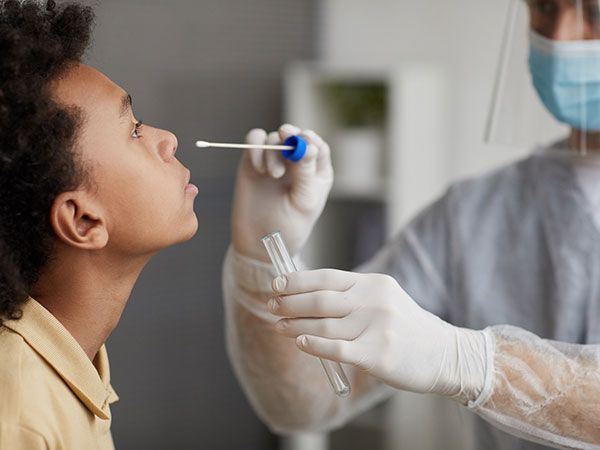
For the last two years, a team within the UAB School of Public Health has facilitated voluntary, weekly COVID-19 testing and infection prevention services to the staff and students of Alabama’s K-12 schools. Through both on-site polymerase chain reaction (PCR) tests administered by a testing provider and over-the-counter rapid antigen test kits that could be taken home, more than 925,000 total COVID-19 tests were administered to participants throughout this program. The COVID-19 Testing and Prevention in Alabama’s K-12 Schools Program is the largest single funded grant in the UAB School of Public Health’s history at $142 million.
Through the American Rescue Plan Act of 2021, the CDC-led initiative ELC Reopening Schools, offered funding and support to every state for COVID-19 screening testing and other mitigation activities in K-12 schools. The goal of this program was to help schools reopen and remain open for in-person instruction by monitoring COVID-19 cases through asymptomatic testing. States who chose to participate executed their programs in different ways, some through their state health departments, some through universities and others through state departments of education. Alabama’s program was accomplished through a partnership between the UAB School of Public Health, the Alabama Department of Public Health and the Alabama State Department of Education.
To implement the program in year one, the UAB team met with public school superintendents, school nurses and private school principals across the state. Superintendents who chose to participate in the program were able to opt in on behalf of their district but left the decision to participate to individual schools’ leadership.
“Throughout the program, we continued to clearly communicate that testing was voluntary and free, and that participants may opt in or out of the program at any time,” said Martha Wingate, DrPH, the program’s Principal Investigator. “Parents were required to consent on behalf of their children. We wanted the faculty and staff of our K-12 schools and most importantly, Alabama’s parents, to know that we were here to help keep their school communities healthy and in the classroom, where we know learning is best achieved. We were able to offer the peace of mind of a negative COVID-19 test ahead of a student visiting their grandparent, or a teacher attending a family gathering, something that was less attainable before at-home tests were sold in stores. To me, this is public health in action.”
In summer 2022, the program expanded beyond K-12 schools, offering on-site testing to summer camps, vacation bible schools and early learning centers. Then as the Pandemic persisted in fall 2022, the ELC Reopening Schools initiative extended K-12 testing programs for a second year. At this time, UAB’s team began to offer additional services. The expanded services included HEPA air purification systems with two years of replacement filters, optional student rewards cards, rapid over-the-counter (OTC) COVID-19 test kits, supplemental funding for participating private and public school districts as funds were available, and funding for schools to hire on-site testing liaisons to help coordinate the logistics of on-site testing, taking the burden off of school staff. In the program’s second year, schools were not required to offer weekly testing to receive the new services which allowed for customization of the program’s offerings by school.
The bulk orders of OTC rapid test kits were favorable for use ahead of larger gatherings including dances, sporting events and assemblies. HEPA air purification systems were available to place in high-traffic areas in schools such as cafeterias, gymnasiums, nurses’ offices and larger classrooms.
The HEPA air purifier service became particularly helpful during the months-long landfill fire in St. Clair County that began in late 2022. In January 2023, UAB’s team reacted by shifting from offering 10 HEPA units per school to offering HEPA units for every single classroom within a 10-mile radius of the fire. The program team was met with gratitude from recipients near Moody and received overwhelmingly positive reactions from school leadership, teachers and families across Alabama. A total of 717 Alabama schools opted to receive HEPA filtration systems, and the team distributed 24,044 air purifiers and 76,642 filters.
By the end of the program in July 2023, a total of 814 schools and 139 districts participated in the program in any capacity, either through on-site testing or by receiving the program’s additional services. 24,142 students and 3,692 staff consented to participate in on-site testing, leading to 546,838 total on-site tests provided, identifying 3,425 positive results over two years. OTC rapid antigen tests totaled 383,231 distributed and results were not collected from these test kits.
“I want to congratulate Dr. Wingate and her team for the incredible service they have provided to both support our children’s learning environments and to protect the public’s health,” said Paul Erwin, M.D., DrPH, dean of the UAB School of Public Health. “Carrying out a program of this magnitude was akin to going from sipping out of a paper cup to drinking from a fire hose. That we were able to partner with ADPH and ALSDE to do this for the whole state reinforces the central role that UAB can play for the good of all Alabamians.”